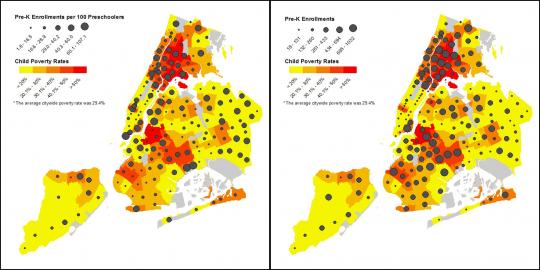Blog
|
March 12, 2015 City’s Pre-Kindergarten For All Initiative Reaches Children Across the 5 Boroughs with Children in the Poorest Districts Benefiting Greatly
Click here to download pdf of this analysis and to view maps. There are nearly 1.8 million children living in New York City and about half a million of them are under the age of five. Nearly 30 percent of all NYC children reside in poverty, and in some communities child poverty rates reach 50 percent or more. We know too that less than one third of the city’s elementary and middle school children are meeting math and reading standards. For these children and all children, access to high quality early education supports social and emotional growth, promotes school readiness, and provides the foundation for academic success. CCC and the vast majority of New Yorkers supported Mayor de Blasio’s call for full-day universal pre-kindergarten because high quality early education is a vehicle through which to not only improve child outcomes but to combat inequality in NYC. In the 2014-15 school year, full-day universal pre-k reached 53,000 four-year olds. In the 2015-16 school year, the city aims to create universal access for all four-year olds — estimated to reach about 70,000 children based on public school kindergarten enrollment. When we examine data on full-day pre-k enrollment in the initiative’s first year, we see that the footprint for the city’s Pre-K for All program is large with children benefiting across the five boroughs. Furthermore, contrary to a recent report, Expanding Preschool in New York City – Lifting Poor Children or Middling Families?, which suggests wealthier districts of the city have benefited disproportionately from the city’s pre-kindergarten initiative, our analysis of the data reveals that the majority of pre-k enrollments concentrate in neighborhoods where child poverty rates exceed the citywide average. Specifically, our first map presents the enrollment data as a rate per 100 preschoolers in each zip code, overlaid on child poverty rates by zip code. Examining enrollment data as a rate allows us to take into consideration varying child populations across the city. This map demonstrates that Pre-K for All reaches every community across the city with children in communities with high poverty rates benefiting greatly. The second map illustrates the total number of enrollments in NYC pre-k by zip code, again overlaid on child poverty rates. This map illustrates that the majority of the enrollments in pre-k (53.5%) are in zip codes with child poverty rates that exceed the citywide average of 29.4%. As the city’s oldest independent child advocacy organization, CCC would offer that the success of efforts to bring full-day pre-k to all four-year olds in NYC demonstrates just how impactful New Yorkers can be when we and our elected and appointed officials band together around child policy priorities. CCC looks forward to the second phase of expansion of full-day pre-k and believes that the success of Pre-K for All must be leveraged to inform the expansion of and access to high quality early education services for children ages zero to three. Click here to download pdf of this analysis and to view maps. |
Comments |





comments
Please keep all comments civil and on-topic. CCC reserves the right to remove any comments deemed inappropriate.“In today’s economy, when having both parents in the workforce is an economic necessity for many families, we need affordable, high-quality childcare more than ever. It’s not a nice-to-have — it’s a must-have. So it’s time we stop treating childcare as a side issue, or as a women’s issue, and treat it like the national economic priority that it is for all of us” – Barak Obama.
Child Care Programs are especially made for children’s of economically weaker section. These programs helps through education for economically challenged children and families to build a positive future in our community. They generally provide quality childcare, early education, preschool and pre-kindergarten programs, after-school care, summer camps, health and wellness services and family support programs. They prepare children for a lifetime commitment to learning and social achievement, while empowering their families with resources to be healthy, stable and successful. Chris Salamone is the present CEO of the law firm, Chris M. Salamone & Associates. The law firm is one of the most trusted and reliable organization that is aimed at helping people who are wrongfully arrested in criminal offenses in Boca Raton. At the FFCDC, Chris Salamone has been providing child care programs for children from low-income households. Summer Camp was one of the most notable program of the FFCDC. Also, he has been actively involved in non-profit educational sphere where he shared his views on various subjects relevant to government, law and leadership. http://chrissalamone.com/bio/